
Washington, USA: The Laken Riley Act has sparked discussions due to its potential to impose visa restrictions on citizens of countries that fail to repatriate their undocumented nationals from the United States. This legislation empowers individual U.S. states to request court-imposed visa bans, posing significant implications for visa categories like H-1B and altering the landscape of international relations.
Understanding the Laken Riley Act
The Laken Riley Act is a proposed U.S. law designed to bolster immigration enforcement by targeting countries unwilling to take back their undocumented citizens. The legislation has garnered attention for its far-reaching consequences, particularly for nations with a significant number of undocumented immigrants in the U.S., including India. If passed, it could result in widespread visa bans for citizens of countries deemed non-compliant.
A key aspect of the Act is its requirement for countries to cooperate in repatriating their nationals living illegally in the U.S. This includes verifying their nationality, issuing necessary travel documents, and facilitating their return.
Consequences of Non-Compliance
Failure to meet these requirements could trigger lawsuits by U.S. states seeking visa cancellations. For example, states can appeal to courts to impose restrictions on various visa types, such as H-1B work visas, student visas, and visitor visas, if a country is found to be uncooperative.
The Act grants significant authority to U.S. states, enabling them to take legal action against uncooperative nations. This represents a notable shift from the traditional approach, which relied on federal-level diplomatic efforts. Courts, rather than diplomatic channels, would hold the power to impose sanctions.
Potential Implications for India
Risk of Visa Restrictions
Indian citizens may face visa bans if India is seen as unwilling to repatriate undocumented immigrants. High-demand visas like the H-1B, essential for Indian professionals, could be at risk.
Judicial Actions Over Diplomatic Negotiations
The Act moves the decision-making process from federal diplomacy to judicial authority, reducing the influence of diplomatic talks in addressing compliance issues.
Strain on Bilateral Relations
While India and the U.S. have historically enjoyed strong ties and cooperative efforts on immigration, such as the deportation of undocumented Indian nationals in October 2024, failure to comply with the Act’s mandates could lead to strained relations and punitive measures.
Maintaining Cooperation
India has a history of working closely with the U.S. on immigration matters, as demonstrated by its collaboration on deportations last year. However, the stringent provisions of the Laken Riley Act could test these relations, especially if India’s compliance is perceived as insufficient.





















